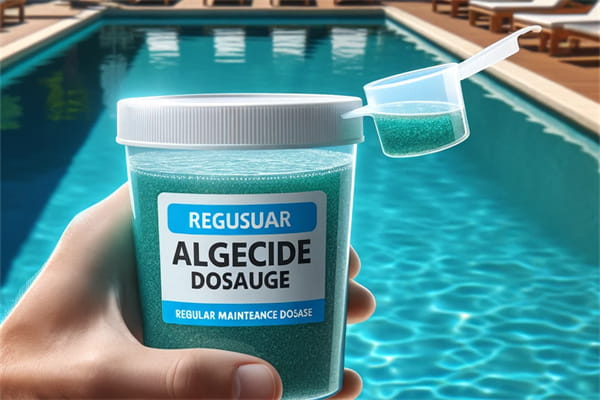To tackle the issue of algae in your pool, you’ve purchased an algaecide. But now, faced with a small bottle and a large pool, you might be wondering, How much algaecide should I add to my pool? Adding the correct amount of algaecide is crucial for effective algae control—too much or too little can affect its performance. This article will tell you on determining the right dosage for your pool.

Ⅰ. Dosage Based on Treatment Timing
1. Initial Dosage
When using algaecide for the first time or after a long period without treatment, you will need an initial “shock” dose. This larger dose helps to quickly establish control over algae and prepare the pool for regular maintenance. Typically, the initial dosage for many algaecides is about 16 ounces (1 pint) per 10,000 gallons of water. Check the specific product instructions for exact amounts.
2. Regular Maintenance Dosage
For ongoing maintenance, a smaller, regular dose is required to keep algae at bay. This ensures that the pool remains algae-free over time without the need for drastic measures. Generally, a maintenance dose might be around 4 ounces (1/4 pint) per 10,000 gallons of water weekly. Regularly applying this dose helps to prevent algae from growing and keeps your pool water clear.
3. Dosage During Algae Outbreaks
When facing an algae outbreak, a higher dose may be necessary to quickly regain control. This intensified treatment helps to eliminate the algae quickly and effectively. For severe outbreaks, follow the product’s specific recommendations, which might suggest doubling the initial shock dose. For instance, you might need up to 32 ounces (2 pints) per 10,000 gallons of water to combat a significant algae bloom.
Ⅱ. Specific Product Examples
Different types of algaecides have varying dosage recommendations. Here are some general guidelines for the most common types of algaecides:
1. Copper-based Algaecide
Initial Dose: 16 ounces per 10,000 gallons
Maintenance Dose: 4 ounces per 10,000 gallons weekly
Outbreak Dose: Follow product instructions, usually higher than the initial dose.
2. Quat (Quaternary Ammonium) Algaecides
Initial Dose: 12-24 ounces per 10,000 gallons
Maintenance Dose: 4-8 ounces per 10,000 gallons weekly
Outbreak Dose: Refer to the product’s specific instructions.
3. Polyquat Algaecides
Initial Dose: 8-12 ounces per 10,000 gallons
Maintenance Dose: 3-6 ounces per 10,000 gallons weekly
Outbreak Dose: Consult the product label for exact recommendations.
4. Natural Algaecides
Initial Dose: Typically more generous amounts initially as per the product guidelines.
Maintenance Dose: Small, regular doses based on the product instructions.
Outbreak Dose: Refer to product-specific guidelines.
Ⅲ. Calculating Pool Volume
If you don’t know your pool’s volume, you can calculate it using the following formulas:
Rectangular Pool: Length (ft) × Width (ft) × Average Depth (ft) × 7.5 = Total Gallons
Round Pool: Diameter (ft) × Diameter (ft) × Average Depth (ft) × 5.9 = Total Gallons
Oval Pool: Length (ft) × Width (ft) × Average Depth (ft) × 6.7 = Total Gallons
Ⅳ. Example Calculation:
Let’s say you have a rectangular pool that is 20 feet long, 10 feet wide, and has an average depth of 5 feet. Using the formula for a rectangular pool:
20ft×10ft×5ft×7.5=7,500gallons
This means your pool holds 7,500 gallons of water.
Ⅴ. Tips for Adding Algaecide
1. Distribute Evenly
Pour the algaecide around the perimeter of the pool to ensure even distribution. This helps the algaecide to reach all areas of the pool effectively.

2. Run the Filter
After adding the algaecide, run your pool’s filtration system for at least 24 hours. This helps circulate the algaecide throughout the pool, ensuring it reaches every corner and kills the algae.
3. Regular Maintenance
Stick to a regular maintenance schedule to prevent algae from gaining a foothold. Regularly test your water chemistry to keep it balanced. Consistent maintenance makes it easier to control algae with minimal effort.
4. Safety First
Always wear gloves and eye protection when handling pool chemicals. Read the safety instructions on the algaecide bottle and store chemicals safely out of reach of children and pets.
 Instant
Quote
Instant
Quote Email
Us
Email
Us